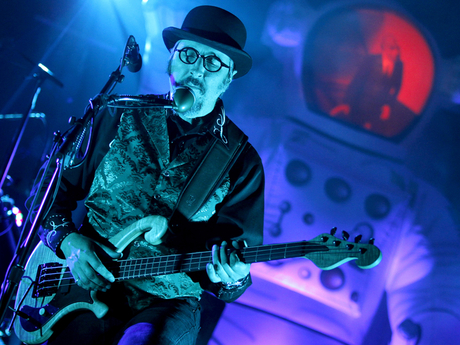
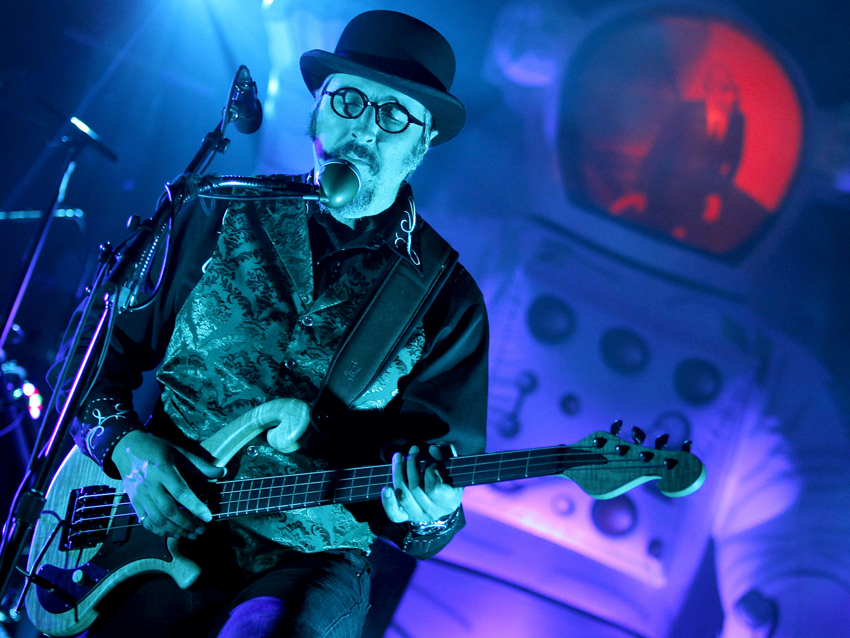
Les Claypool, on stage in Florida this past June, is happy as a clam - no oyster - with Primus. © Sayre Berman/Corbis
"Truthfully, I think it's a great record," says Les Claypool, bassist/vocalist and leader of Primus on the subject of the band's upcoming release, Green Naugahyde, which will be issued on 13 September. It's the first album from the adventurous trio since 1999's Antipop, and more importantly, it marks the debut recording with the band of drummer Jay "Jaysky" Lane, who played with the group in the late '80s.
"In some ways, it feels new in that it's these three guys finally making a record," says Claypool. "And in other ways, it's like classic Primus, kind of like the Frizzle Fry period. We're clicking. Hopefully, that comes through to everybody."
That it should. For years, fans have clamored for a recording of Claypool, guitarist Larry "Ler" LaLonde and Lane, and Green Naugahyde, with its twisted narratives and rollicking rhythmic textures, should satisfy the faithful. Bursting with energy, smarts and musical wizardry, it would be a stunning effort from a young band, but the fact that it's from a group eyeballing its fourth decade is altogether impressive. "We're older, but we're not, like, really old, " says Claypool. "There's a big difference."
Recently, MusicRadar sat down with Les Claypool to discuss the coming together of what many consider to be Primus' 'true' lineup, the recording of Green Naugahyde, and how a funky band gets really funky.
How did you, Larry and Jay get back together?
"It's a funny story. I finished up the cycle for my last solo record, Of Fungi Or Foe, and my manager and I were talking about what I should do next. He brought up the 'P' word, and I was like, 'I don't know…' It just seemed like nostalgia. There didn't feel like anything beyond that. I wasn't really into the idea.
Want all the hottest music and gear news, reviews, deals, features and more, direct to your inbox? Sign up here.
"My manager kept pushing me though, and gradually, I came around. He had been talking to Larry, who really wanted to do it. [drummer] Tim [Alexander, who played with the band on and off since 1989] didn't have that much excitement about the whole thing, so we talked to Jay.
"Jay came and played with us, and it was unbelievable. We played Pudding Time, with is a song Jay helped write, and from the second we were into it, Ler and I were just laughing. It was amazing. That's when we knew: 'Hey, we've gotta do something with this!'"
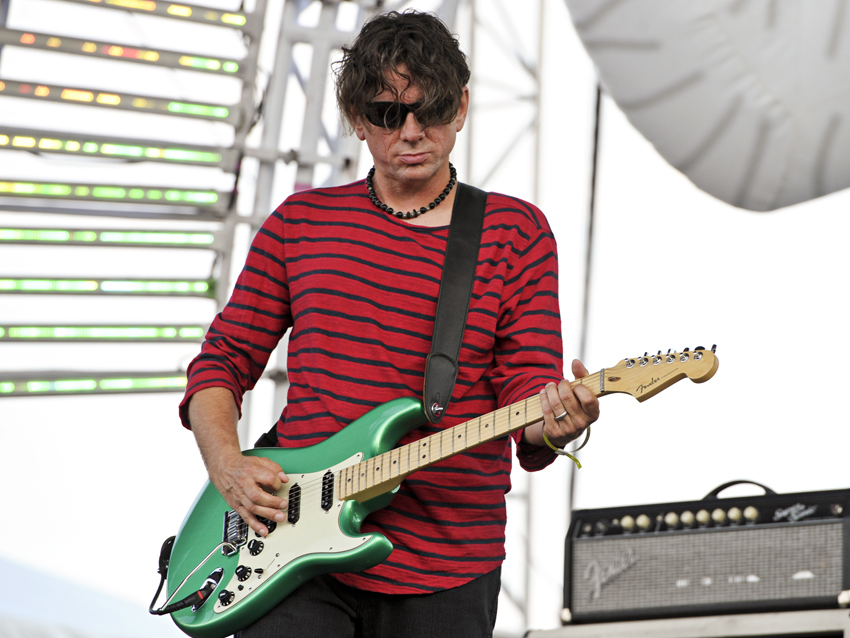
Larry "Ler" LaLonde on stage in Kansas, August, 2011. © Amy Harris/Corbis
Even so, you did tour during the last decade as Primus with Tim.
"Sure. We would get together every once in a while and do it. We'd go out, make a bunch of money and keep the fans happy. But for me, on a creative level, that's not very fulfilling. Touring every three or four years for eight weeks at a time is fine, but it's not the kind of thing that's going to get a new Primus record done."
"For whatever reason, we hit a creative wall with Tim. He's one of the best drummers around, and he's a super-great guy, but we just never clicked with him on a personal level with him. And you can't make terrific music if the whole band isn't clicking as people.
"This is why Tim left in the mid-'90s: nothing was happening with us, nothing was coming. So it's not his fault that things weren't right with him this time. These things happen with bands. Communication and spirit can't be forced; it just has to be there. When the spirit is there, though, that's when you have to jump, and so we did.
Sounds as if Jay coming back was the real piece of the puzzle you were missing.
"Sure, he was probably the missing link. But I think it was a timing thing, too. Band chemistry is a tricky thing. If one guy isn't feeling right with the other guys, everything gets thrown off. When you get the personalities and the chemistry right, that's a grand slam.
"See, the thing to remember is that Jay and I have played together for years. He was in Sausage, Holy Mackerel, Frog Brigade… We're really great friends and have done lots of things. He'd been playing with Bob Weir in RatDog, and it kind of got to the point where I wasn't calling Jay to do these other things because I didn't want to encroach on Bob's thing. I wouldn't want to look like I was stealing his drummer, as strange as that sounds. [laughs]
"The cool thing about Jaysky coming back to Primus is that it's kind of a circle being completed. He quit the band a month before we made our first record. He was with another band that had a deal with Warner Brothers. Nobody knew we were going to do anything. We never thought we'd get on the radio, let alone MTV.
"Primus has always been the boat that he missed, and I think he's always regretted it. It's the fish that got away. When it came around again, he was very excited and very prepared."
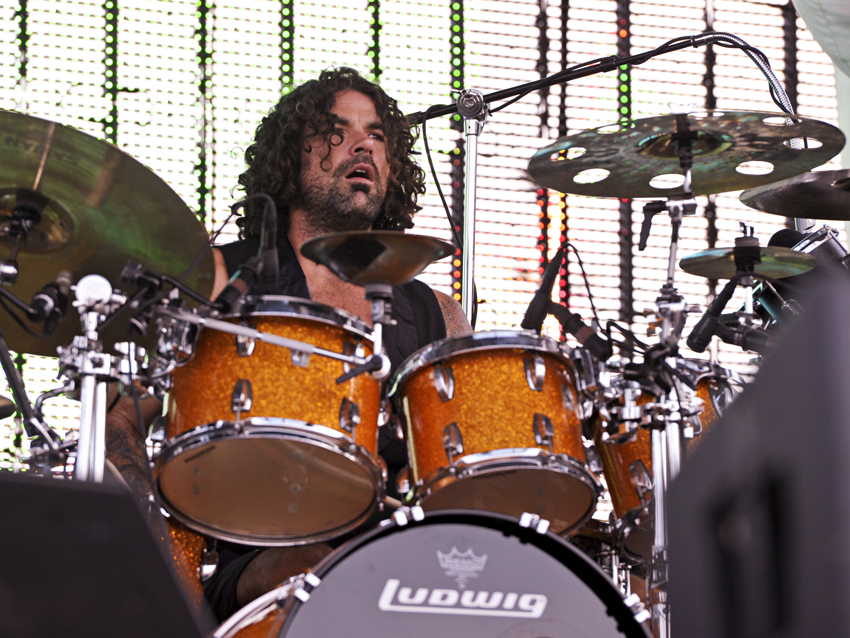
Jay "Jaysky" Lane, back in the Primus fold. © Amy Harris/Corbis
When you, Larry and Jay played together again, did it feel like the Primus of old, or was the sensation something altogether new?
"I guess it was something new, because Ler had never experienced the feeling of playing Pudding Time with Jaysky. Like I said, right from the word go, it was unbelievable. I think Jay's a genius. He's the guy I steal all my licks from. He's one of these goofy guys who wakes up in the morning and he's smiling. He's just an amazing, positive person, and someone like that is nice to be around."
On the new record, even though there's moments of humor and eccentricity, things are dark. Impending apocalypse colors the material.
"I would say so on a good portion of it. Certainly a song like Tragedy's A-Comin', well, just that line says it all! [laughs] I remember when I wrote that riff in my notebook.
"There's a lot of crazy shit in my life right now: My mom is fading away from us; she's not going to be around much longer. My little nephew was diagnosed with leukemia at only two months old. I have friends battling cancer. When I wrote that song, I was just like, 'Holy fucking hell…' Whatever metaphor you want to use: Into everyone's life a little rain must fall. Well, there you go - Tragedy's A-Comin'.
"The funny thing is, the music to that song is very uplifting. I love the contrast of it. From Tommy The Cat to Wynona's Big Brown Beaver, there's a lot of tragic figures in my music and Primus' music. It's just the way I exercise my demons, through these kinds of people."
On Green Naugahyde, what was the writing process? Were songs born out of jams? Did you write sketches of tunes and demo them for the other guys?
"It depended on the song, really. The one thing I insisted on was that everybody brought in some material, because that wasn't a Primus thing in the past - not that it wasn't encouraged, it just never happened.
"In the past, it was usually me bringing something in, or us using bits and pieces of jams from rehearsals and soundchecks. I wanted Ler and Jaysky to contribute to the new record. Ler has two or three cuts that are solely credited to him musically. Jaysky brought in a couple of beats that became Eyes Of The Squirrel and Green Ranger.
"For me, these are amazing things because they give me different perspectives. Take Ler's music for Jilly's On Smack: I would never write a song where I played a bunch of whole notes. 'Hey, everybody! Follow me…' [laughs] How's that gonna work? But Ler had this guitar part and arrangement, and I came in and supported it. It's very gratifying for everybody to work like that."
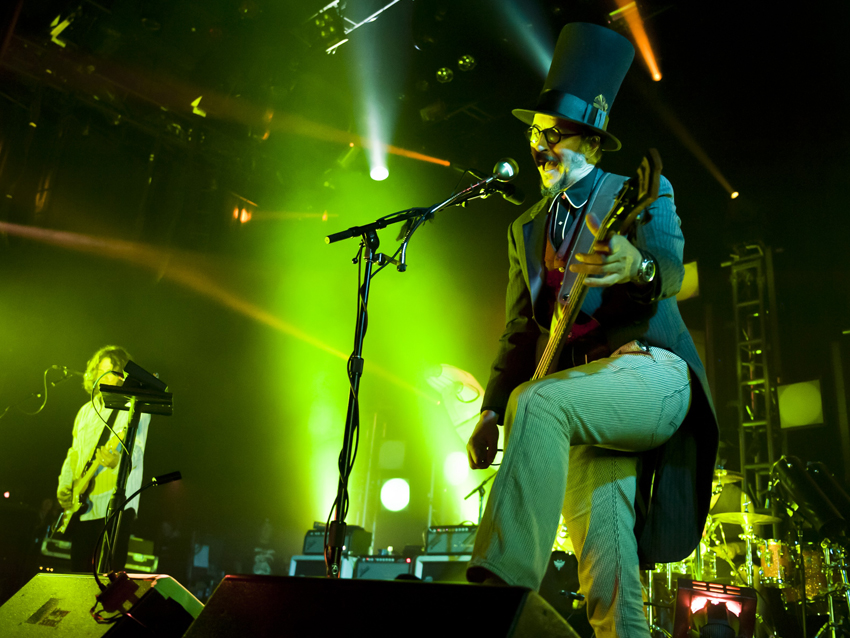
Primus rocks - and funks - the Club Nokia in Los Angeles, 2010. © Paul R. Giunta/Corbis
The song Hennepin Crawler has such a strong riff. Do you work out riffs at home while playing and noodling around?
"It varies. I'm a big believer in spontaneity. In the case of Hennepin Crawler, we were just sitting in the studio and I started going [imitates a bass] 'Bam-da-dum-dum-dum!' Jaysky heard it and jumped in right away. Then Ler joined in and I hit the record button. There it was.
"In the case of something like Lee Van Cleef, I had that sitting around for a while. If I'm home and I come up with something, I'll try to record it, but a lot of the time I'll forget to. A lot of things go off into space and never come back 'cause I just don't remember them. Lee Van Cleef stuck around. I came up with it on my Dobro bass and really liked it, so I recorded it."
In so many songs, and this is certainly true in Last Salmon Man, you blur the lines between rhythmic bass playing and soloing.
"Well, it's all rhythm, isn't it? [laughs] I know what you mean, though - melodic playing. I never think about rhythm versus melody; I've always just played to what's in my head. Paul McCartney; Geddy Lee; Mark Sandman [from the band Morphine], even though he used only two strings - so many great bass players mixed it up, and it was a true part of their style.
"For me, it depends on the gig. I spent a lot of time playing in R&B bands, and I did the job. That job doesn't call for what I do in Primus. Primus is a different ball game. The bass is just the crayon that I picked out of the box. I'd probably be writing similar stuff if I played guitar or trumpet. The pictures I want to draw I do with this crayon I chose, which is the bass."
Tragedy's A-Comin' is a very funky song. The chorus, especially, has a Talking Heads/Remain In Light vocal thing happening. Now, in the past, you've bristled at the word 'funk' being applied to your music.
"Yeah, that's true. I hear what you mean in the chorus, which to me is very Isley Brothers - and Talking Heads. I grew up on both bands. See, the whole thing about funk…I was embarrassed for many years when people would call Primus a funk band. 'Oh, Primus? They're a funk band.' No. We're not a funk band. Sorry. [laughs]
"For many years, I was the only guy in the band who had any connection to funk or soul or R&B, so I was very embarrassed to have that word applied to Primus because of all the people I respected. Bootsy, George Clinton, Larry Graham - I'd hate for them to buy one of our records, like, 'Hey, I heard about this Primus band, they're supposed to be funky.' And then they'd listen to it and go, 'What the fuck is this?' You know what I mean? [laughs] Just because I'm thumpin' on the bass doesn't mean it's funk.
"We were never funky. We're funky now. With Jaysky in the band, I feel that we're way funkier than we ever were. He's like Mr East Bay Grease, Dave Garibaldi, Morris Day & The Time - that was his shit back in the day. So on songs like Tragedy and Lee Van Cleef, I have no problem saying we're funky, because Jaysky's the funkiest guy I've ever played with - and I've played with some very funky dudes! [laughs]
"You know, the other thing is the very word itself - 'funk.' It's been so overused and bastardized. To me, if you're going to talk about funk, you have to go back to George Clinton and Bernie Worrell. Those guys are the giants. I've played with Bernie, and it was unreal. He's the master."
The ending of Eyes Of A Squirrel is very Pink Floyd.
"Oh, yeah. [laughs] That was intentional. We go into space during that part. I call it 'Space.' One of my intentions on this record was to go into space on a nightly basis. I wanted to create parts on this record where we can go off on tangents live. I can turn around and play to the screen for 15 minutes - it'll be great!" [laughs]
You've talked about some of your early influences, people like Chris Squire, Geddy Lee, Stanley Clarke and Larry Graham. Has there been anybody new that's gotten to you?
"Well, see, all of those people are bass players. I don't really listen to bassists - not anymore. When I was younger, I listened to those guys and was trying to figure out everything they did. Nowadays, I draw inspiration from everybody. Marc Ribot inspires me tremendously, and he's a guitar player. Stewart Copeland is a massive influence, and he's a drummer.
"I was a huge fan of Marc Sandman and Morphine. Here was a guy who played two-string bass, and he was amazing. So much emotion and soul and vibe came from that guy. It sucked when he died. I heard some Muse recently, and I liked them. Those guys are good. And right now I'm going through a big Eddie Cochran and Roger Miller phase. You never know the iPod shuffle will land."
You have many basses, but was there a specific go-to bass for this album?
"I don't think I played any six-string bass at all on this record. I have a new bass that I designed myself and did the primary shaping on. A buddy of mine built it and I just love it. It's the main bass on the record. It's the prototype, but it'll be the Caypool bass, the Pachyderm model, whatever. Knowing me, I'll end up buying all of them! [laughs]
"We'll market it independently. We might put some up on eBay for my nephew, who's suffering for leukemia. I don't know, I haven't really thought about it yet. But I used it exclusively - that and my Dobro bass and the upright bass."
What kind of amps did you use on the record?
"I didn't use any. I go through a couple of API channel strips and a few stomp boxes - that's it. Live, I'll use the same thing, only through power amps into Ampeg 4x10s. I'm not that fussy with my gear."
Joe is a freelance journalist who has, over the past few decades, interviewed hundreds of guitarists for Guitar World, Guitar Player, MusicRadar and Classic Rock. He is also a former editor of Guitar World, contributing writer for Guitar Aficionado and VP of A&R for Island Records. He’s an enthusiastic guitarist, but he’s nowhere near the likes of the people he interviews. Surprisingly, his skills are more suited to the drums. If you need a drummer for your Beatles tribute band, look him up.
